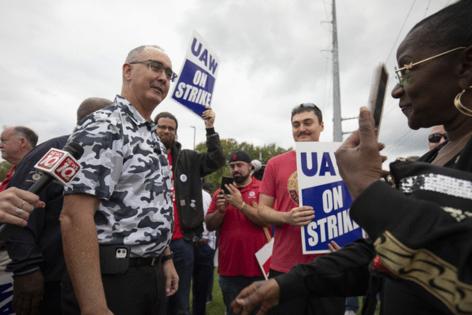
Negotiations between the United Auto Workers and Detroit Three automakers continued Sunday — day 17 of an unprecedented strike by the union against Ford Motor Co., Stellantis NV and General Motors Co.
The strike started Sept. 15 with the UAW unleashing a targeted walkout strategy starting with plant work stoppages at Ford's Michigan Assembly in Wayne, Stellantis' Toledo Assembly Complex and GM's Wentzville Assembly in Missouri.
The strike has been expanded twice to include all Stellantis and GM parts distribution centers and on Friday added two SUV plants: GM's Lansing Delta Township plant and Ford's Chicago Assembly — bringing the number of autoworkers on strike to 25,300 out of 146,000 UAW members at the companies.
Stellantis' facilities were spared the latest expansion since the Jeep and Ram maker made progress in talks with the union on areas including cost-of-living adjustments that had been suspended in 2009, the right not to cross a picket line, the right to strike over product commitments and plant closures, and an outsourcing moratorium.
"I actually took it as a big sigh of relief that Stellantis made significant movement," said Art Wheaton, an automotive industry specialist at Cornell University's Industrial and Labor Relations School.
"To me, that was great news. Primarily because I was most concerned about Stellantis going in. It seems to me that they are going along closer to the pattern and they may actually stick with pattern bargaining."
Ford had previously been spared in the union's first move to expand the strike targets. The Dearborn automaker had made progress the week leading up to Sept. 22 in talks with the Dearborn automaker on cost of living adjustments, wage disparities at feeder plants and job security protections.
Despite some progress on certain items, Ford slammed the union on Friday after the strike expansion that added the Chicago Assembly plant where the Ford Explorer and Lincoln Aviator are built. Ford CEO Jim Farley accused the union of "holding the deal hostage" over the automaker's four planned electric-vehicle battery plants in the United States.
Late Friday, GM CEO Mary Barra issued a scathing statement against the union claiming it has "no real intent to get to an agreement."
The automakers and union have remained far apart on the union's demands to provide pensions for all employees, retiree health care, a restored jobs bank and wage increases of 36% over four years. The companies have offered wage hikes of about 20% while expressing concern that granting all of the union priorities would further widen the gap between their employee costs and those of non-union competitors such as Tesla Inc., Toyota Motor Corp. and Honda Motor Co.
Detroit Three automaker costs are in the mid-$60 range while foreign automakers' labor costs are in the mid-$50 range and Tesla Inc.'s are in the high-$40 range.
With Stellantis and Ford making moves on cost-of-living increases, Wheaton thinks GM could be next.
"Maybe GM will follow suit ... especially with all of the firepower that's all on the UAW side at the moment," he said. "I don't hear a whole lot of criticism from the public."
How it feels on the picket line
Workers who build the Bronco and Ranger at Ford's Michigan Assembly are heading into their third week on strike.
"I would like to get back to work but only with the proper contract," said Patrick Smalley, who's been with Ford for 35 years.
Smalley, 56, of Westland is ready to stay out for "however long it takes."
Feelings about still being on strike are mixed on the picket line, Smalley said.
"Some people had prepared for it and others may not have and it's getting to the point where, 'OK, I would love to go back to work,' some people are saying, but if we just have to do it, we have to do it," he said.
Fellow Michigan Assembly worker Kim McCartha, who's been at Ford since 2012, is ready for the two sides to come to an agreement.
"But I know that we do want a good deal, a fair deal," the 58-year-old from Redford said, noting she wants to see wage increases, restoration of cost-of-living allowances and the tiered-wage system addressed in the next contract.
Before the strike, McCartha started watching her spending.
Now, with strike pay at $500 a week, she's still "being real cautious and just waiting, not going on trips or not doing anything extra," she said.
Being on strike, "it's a little bit different for me than being on the line," she said. "But hey, I'm ready to grind it out as long as we have to."
Auto sales out this week
The Detroit Three report their third-quarter sales this week, but experts don't expect to see the strike affecting them just yet.
Analysts at Edmunds.com Inc., a vehicle information website, are forecasting sales of 3.9 million new cars and trucks in the United States for the third quarter of 2023, marking a 16% year-over-year increase.
Before the strike, Edmunds' data showed Detroit Three vehicles sat on dealer lots longer than the industry average.
In a statement sent last week, Edmunds Director of Insights Ivan Drury said: “Availability is currently strong for American-branded trucks and SUVs, but shoppers contemplating a new-vehicle purchase from any of the Detroit brands may consider expediting their search process given the strike’s unpredictable impact on supply."
_____





